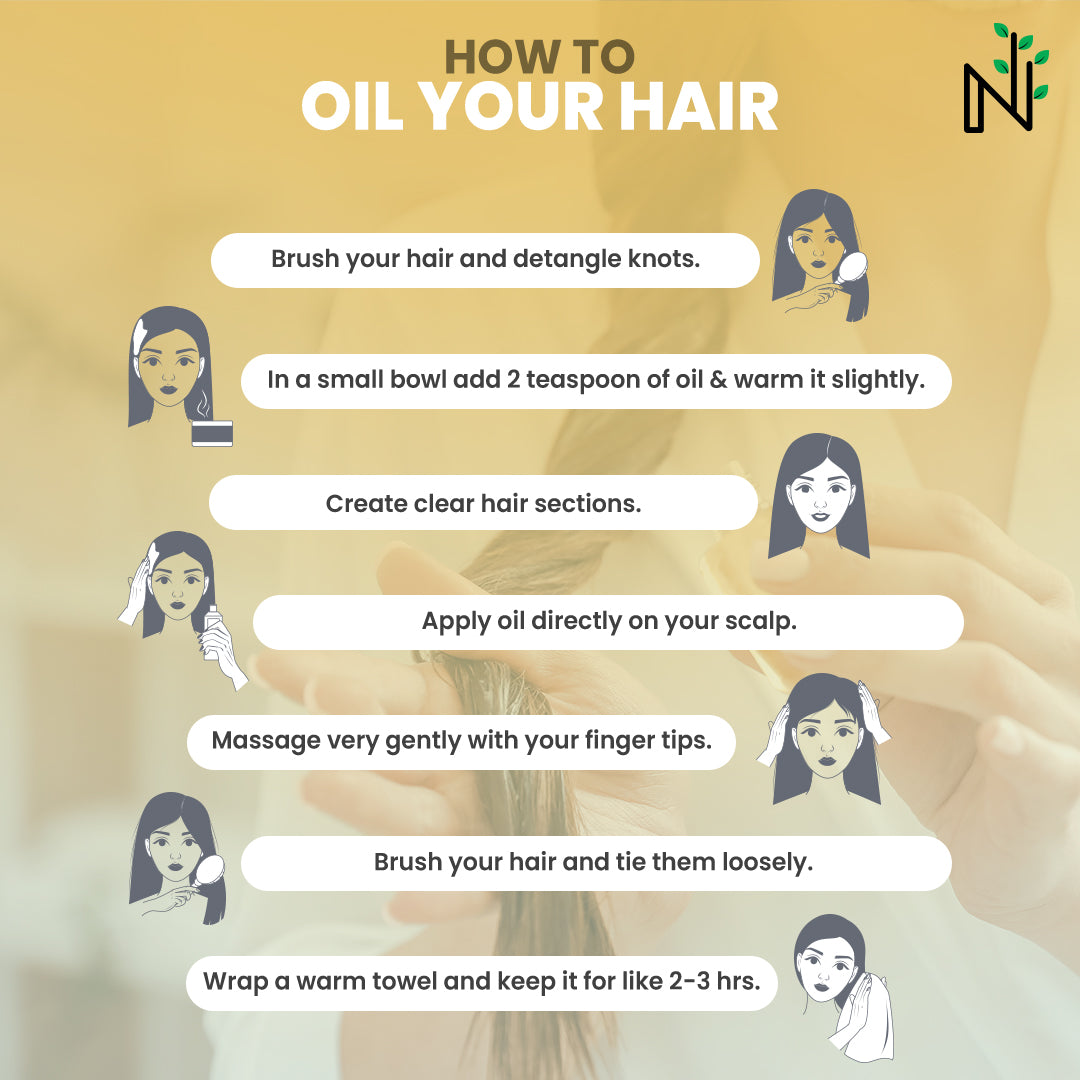
Benefits of Oiling Hair - Best Hair Oil - How to Oil your Hair?
Share
Benefits of Oiling Your Hair
Oiling your hair can provide several benefits for your hair and scalp health. Here are some potential advantages of oiling your hair:
-
Moisturizes the scalp: Applying oil to your scalp helps to moisturize and nourish it, preventing dryness and flakiness. It can also reduce itchiness and discomfort associated with a dry scalp.
-
Conditions and softens the hair: Hair oil can penetrate the hair shaft, providing hydration and improving the overall texture of your hair. It helps to seal the cuticles, making the hair smoother, softer, and more manageable.
-
Enhances hair strength and flexibility: Regular oiling can strengthen the hair strands, reducing breakage and split ends. It adds a layer of protection to the hair, making it more resistant to damage caused by styling tools, heat, and environmental factors.
-
Promotes hair growth: Massaging oil into your scalp increases blood circulation, which can stimulate hair follicles and promote hair growth. Certain oils, such as coconut oil and castor oil, are believed to have specific properties that may support hair growth.
-
Adds shine and luster: Applying oil to your hair can give it a healthy, natural shine, making it appear more vibrant and lustrous.
-
Reduces frizz and tames flyaways: Hair oil can help tame frizz and flyaways, making your hair more manageable and easier to style.
-
Provides stress relief and relaxation: Massaging oil into your scalp can be a soothing and relaxing experience. It may help relieve stress, promote relaxation, and provide a sense of well-being.
When oiling your hair, it's important to choose the right oil for your hair type and needs. Different oils have varying properties and benefits, so consider factors like hair porosity, texture, and specific concerns (e.g., dryness, dandruff) when selecting an oil. Additionally, the frequency and duration of oiling can vary depending on personal preference and the condition of your hair and scalp.
Which is the Best Hair Oil for Dry-Oily-Damaged Hair?
For dry-oily-damaged hair, a combination of oils can help address multiple concerns. Here's a suggestion for a blend of hair oils that can be beneficial for such hair type:
-
Jojoba oil: Jojoba oil closely resembles the natural sebum produced by the scalp, making it suitable for balancing oil production. It can help moisturize the dry areas of your hair and scalp without leaving a greasy residue.
- Argan Oil: Argan oil is deeply moisturizing and nourishing, making it ideal for dry and damaged hair. It helps restore shine, manageability, and softness to the hair, while also taming frizz.
- Mustard Oil: Nourishment and conditioning: Mustard oil is rich in essential fatty acids, minerals, and vitamins. It can deeply nourish and moisturize the hair, providing a natural conditioning effect. Hair growth promotion: The high content of omega-3 fatty acids in mustard oil helps stimulate blood circulation in the scalp, promoting hair growth and preventing hair loss. Anti-fungal and antibacterial properties: Mustard oil possesses natural antifungal and antibacterial properties, which can help combat scalp infections and dandruff.
- Coconut Oil: Deep hydration and moisture: Coconut oil is highly moisturizing and can penetrate the hair shaft, providing deep hydration and preventing moisture loss. Strengthens and reduces breakage: The fatty acids in coconut oil help strengthen the hair shaft, reducing breakage and split ends.
- Apricot oil: Moisturizes and softens hair: Apricot oil is lightweight and easily absorbed, making it an excellent choice for moisturizing and softening the hair without weighing it down. Protects against damage: The high content of antioxidants in apricot oil helps protect the hair from environmental damage and oxidative stress.
- Almond Oil: Hydration and nourishment: Almond oil is rich in vitamins, minerals, and fatty acids that deeply hydrate and nourish the hair, preventing dryness and promoting overall hair health. Almond oil's mild and soothing properties can help alleviate scalp irritation, itchiness, and dandruff.
How to Oil your Hair?
Here are the steps to follow:
1. Brush your hair and detangle the knots.
2. In a small bowl, add 2 teaspoon of oil and warm it slightly.
3. Create clear hair sections.
4. Apply oil directly on your scalp.
5. Massage very gently with your finger tips.
6. Brush your hair and tie them loosely.
7. Wrap a warm towel and keep it for 2-3 hrs.
